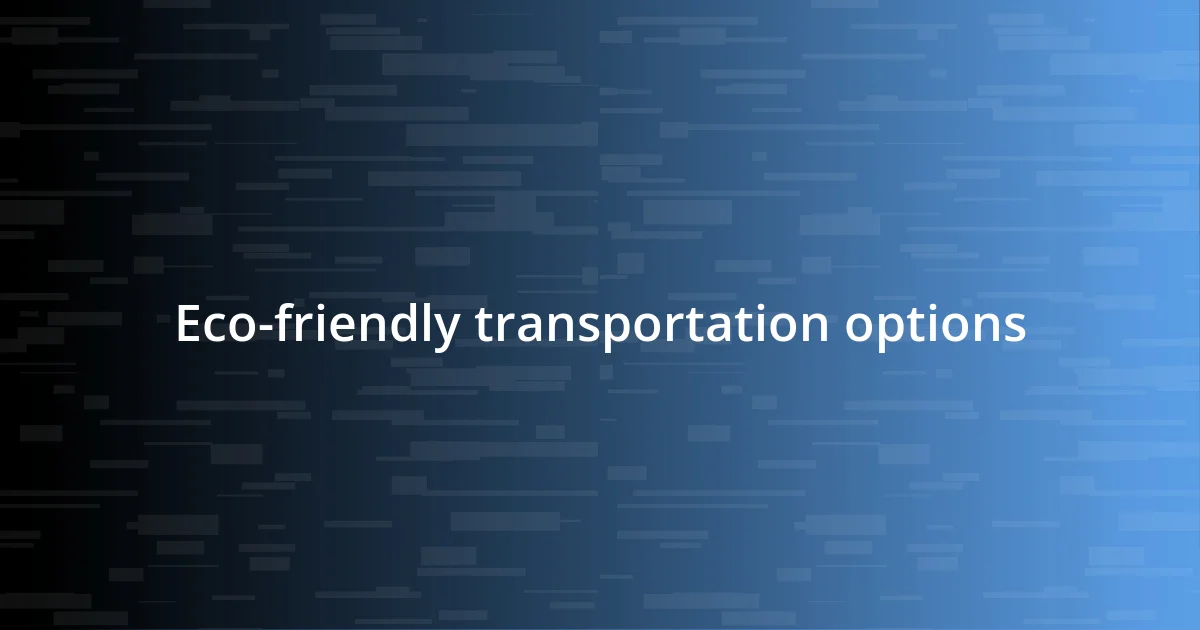Key takeaways:
- Eco-friendly travel emphasizes sustainability and cultural connection, encouraging mindful accommodation choices and local experiences.
- Benefits of sustainable travel include unique experiences, economic growth for local communities, and enhanced personal well-being through nature connection.
- Adopting practices like using reusable items, supporting local businesses, and choosing eco-friendly transport significantly reduces travel waste and environmental impact.

Understanding eco-friendly travel
Eco-friendly travel is more than just a trend; it’s a mindset shift towards sustainability and respect for our planet. I remember my own experience traveling to Costa Rica, where every small choice felt significant—from choosing accommodations that prioritize green practices to exploring nature through locally guided tours. Isn’t it refreshing to know that our travel decisions can contribute positively to the environment?
One of the most striking aspects of eco-friendly travel is the idea of leaving no trace. This phrase resonates deeply with me, reminding me of a hike I took in the Rocky Mountains where I was surrounded by pristine beauty. The thought that my presence could either harm or preserve that delicate ecosystem stayed with me. Have you ever thought about how your footprints could impact the environment long after you leave?
Understanding eco-friendly travel also means connecting with local cultures in mindful ways. On a recent trip to Italy, I made it a point to dine at small, family-run restaurants that sourced ingredients locally. This not only satisfied my palate but also deepened my appreciation for the culture and community there. How often do we consider the ripple effect our travel choices have on the places we visit?

Benefits of sustainable travel
Adopting sustainable travel practices brings numerous benefits, not only to the environment but also to travelers themselves. I’ve found that choosing eco-friendly lodging often leads to unique experiences—like when I stayed at a small eco-lodge in Colombia. The owners were passionate about conservation, and I could feel their dedication in every detail, from how they managed waste to the local wildlife tours they offered. This connection creates a richer travel experience, don’t you think?
Moreover, sustainable travel can have significant economic benefits for local communities. During my time in Thailand, I was struck by how much my stay at an eco-friendly resort positively impacted the surrounding villages. The resort invested in local initiatives, such as offering training for residents to participate in tours. This not only provided jobs but also ensured that the community thrived. How often do our travel choices help others, right?
Lastly, making eco-conscious choices can lead to enhanced personal well-being. I remember a moment while kayaking in a protected marine area, marvelling at the clear waters and diverse marine life. It was a reminder of why we travel—to connect and rejuvenate. Opting for sustainable travel often allows us to reconnect with nature, fostering a sense of peace and fulfillment. Does that resonate with you, too?
| Benefit | Description |
|---|---|
| Unique Experiences | Engagement with passionate local hosts enriches travel. |
| Economic Growth | Supporting local initiatives boosts community livelihoods. |
| Personal Well-being | Reconnect with nature promotes peace and fulfillment. |

How to choose eco-friendly destinations
When it comes to choosing eco-friendly destinations, evaluating your options is key. I often look for places that have adopted sustainable tourism initiatives. For instance, during my travels to Iceland, I was genuinely impressed by their commitment to renewable energy and protecting the stunning natural landscapes. I felt a sense of responsibility knowing that my visit supported their conservation efforts.
When selecting an eco-friendly destination, consider these factors:
-
Local Conservation Efforts: Look for destinations that actively engage in preserving wildlife and natural habitats. I remember visiting a wildlife sanctuary in South Africa, and seeing first-hand how my entrance fee contributed to their vital work.
-
Community Involvement: Choose places where local communities are involved in tourism. I once participated in a cultural exchange program in Bali, which directly benefited the village and fostered meaningful interactions.
-
Eco-Certified Accommodations: Prioritize hotels or lodges with eco-certifications. I once stayed at a green-certified hotel in New Zealand, and the experience was enhanced by their commitment to sustainability, from sourcing local materials to implementing energy-saving measures.
-
Transportation Options: Research how to get around the destination. I found it refreshing to use bicycles in Amsterdam, not only reducing my carbon footprint but also immersing myself in the local lifestyle.
By seeking out these qualities, you not only contribute to preserving our planet but also enrich your travel experience in ways that you may not have anticipated.

Tips for reducing travel waste
To reduce travel waste, one of the simplest yet most effective tips is to pack reusable items. When I started carrying a collapsible water bottle and a set of metal straws, I realized how often I would have avoided single-use plastics. It not only made my travel more sustainable but also felt good to see how easy it was to make a positive change.
Another practice I adopted is to minimize food waste while traveling. I learned to embrace local markets during my trips. I remember browsing through vibrant stalls in Mexico, picking fresh fruits and snacks to enjoy, which allowed me to savor the local culture while avoiding unnecessary packaged food. Have you ever thought about how local sourcing can transform not just your palate, but the way you interact with a place?
I also focus on using digital documents instead of paper. I vividly recall a trip where I opted for digital boarding passes and reservations. It cut down on paper clutter significantly. Plus, I felt a sense of modern convenience that made my travels feel more streamlined and efficient. Isn’t it liberating to know you’re carrying less while still enjoying all the essentials?

Eco-friendly transportation options
When exploring eco-friendly transportation options, I often find that public transport can be a game-changer. My trip to Tokyo opened my eyes to the efficiency of trains and subways. Riding the vibrant, punctual rail system, I felt a genuine connection to the city as I zipped along, understanding how this, in turn, reduced emissions compared to cars. Isn’t it amazing how using public transport can transform our experience and lessen our environmental impact at the same time?
Biking is another fantastic way to get around, and my experience in Copenhagen was unforgettable. I remember feeling elated as I pedaled through the bike lanes, surrounded by locals and enjoying the fresh air. It’s not just about reducing my carbon footprint; it’s about embracing the rhythm of city life. Don’t you think that when you travel this way, it adds a layer of intimacy to your experience?
Carpooling or ridesharing services can also be eco-friendly alternatives. On a recent trip to a national park, I joined a group of fellow travelers in a shared vehicle. Not only did we bond over our shared interests, but I also felt a sense of community and responsibility knowing we were collectively reducing our environmental impact. Isn’t it heartening to know that sustainable travel can create friendships along the way?

Packing for sustainable travel
When it comes to packing for sustainable travel, I’ve learned to choose versatile clothing. I remember one trip to Thailand where I packed items that could mix and match easily. This not only saved space but also reduced the need for trendy, fast-fashion finds I might have bought on the go. Have you ever thought about how doing this can not only lighten your luggage but also minimize waste?
I also gravitate towards eco-friendly toiletries. For instance, I switched to solid shampoo bars and biodegradable soap on my last hiking trip. It felt wonderful to not only cut down on plastic waste but also to know I was leaving no trace behind, literally and environmentally. It’s a small change, but isn’t it empowering to know that every little decision counts when traveling?
Investing in an eco-friendly travel bag has been a game changer for me. I still remember unpacking my new recycled material backpack before a trip to the Alps. Not only was it stylish and durable, but it sparked conversations with fellow travelers about sustainability practices. Don’t you just love when your travel choices inspire others to consider their own impact?

Supporting local communities while traveling
Supporting local communities while traveling is something I absolutely believe in. On a visit to a small village in Peru, I stayed in a locally-owned guesthouse. The warm welcome I received from the family made me realize how travel can directly impact their livelihood. Isn’t it rewarding to know that my stay contributed to their success and helped preserve their culture?
When I made it a point to eat at local restaurants instead of chain establishments during my travels, I felt more connected to the flavors and stories of the place. I distinctly remember savoring a home-cooked meal in a tiny eatery in Mexico. The owner shared her grandmother’s recipe, and that experience was priceless. How often do we miss such authentic moments when opting for convenience over community?
I always try to support local artisans by purchasing handmade souvenirs. On my last trip to Bali, I spent an afternoon at a craft market, chatting with talented artists about their work. I left not just with beautiful creations but also with a deeper appreciation for their craftsmanship. Isn’t it amazing how these small purchases can create a ripple effect, strengthening the local economy?













